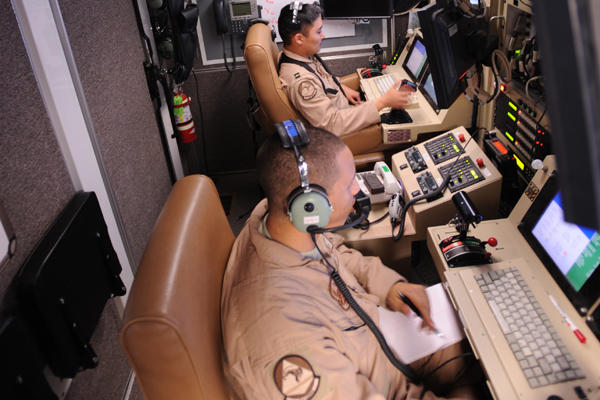For the first time, the U.S. Air Force next year will offer a critical skills retention bonus to airmen who fly remotely piloted aircraft such as the Predator drones that have become a signature weapon of war over the past decade.
The service on Tuesday announced that pilots who agree to remain in service for five more years will be eligible for a Critical Skills Retention Bonus of up to $125,000. Other RPA pilots, meanwhile, will continue to be eligible for Aviator Retention Pay that could give them from $75,000 to $225,000, depending on how many additional years of service they commit to.
"RPA missions are increasingly critical to national security, and our ability to retain experienced RPA pilots will enable us to meet current and emergent mission requirements," Lt. Gen. Jay Raymond, deputy chief of staff for operations, said in the announcement.
Those eligible for the Critical Skills Bonus and Aviator Retention Pay may apply through Sept. 30, 2016.
It's not surprising the Air Force finally moved on such an incentive. Pilots who graduated from the RPA undergraduate training school -- which the Air Force stood up in 2010 -- are now nearing the end of their initial six-year service obligation. At the same time, the service has been dealing with issues of mission fatigue among those flying the RPAs.
The New York Times in June reported a "significant number" of the Air Force's 1,200 RPA pilots would be coming up on the end of the obligation and were considering leaving the Air Force. The year 2017, then, marks a critical one in the Air Force's bid to retain experienced drone pilots.
In the announcement, Air Force Chief of Staff Gen. Mark Welsh said the cost to train and develop airmen "is a significant investment for the Air Force.
"These incentives are cost effective methods to retain a sufficient force of skilled and experienced aviators to meet our current and future requirements," he said.
Officials said the retention monies included in the 2016 defense budget use the same authorities as all other aviators.
RPA pilots eligible for the critical skills bonus must be lieutenant colonels or below, have chalked up six years of experience since graduating from undergraduate RPA training, and be coming up on the end of their initial RPA pilot training service obligation. The Air Force established an RPA undergraduate school 2010 -- a year after it created the RPA career field (18X) -- so 2016 will be its sixth year of training pilots.
Additionally, eligible pilots must be receiving RPA aviation incentive pay and able to reach the end of their bonus period before completing 25 years of active-duty service.
These pilots will be eligible for a bonus of five annual installments of $25,000, with the option to receive 50 percent of the bonus total payable up front, the Air Force said.
The Aviator Retention Pay amounts for 2016 remains unchanged from 2015 -- $15,000 to $25,000 per year, depending on the aviator category and length of the ARP contract, the Air Force said.
But pilots, including those who signed onto an ARP contract in 2015, can accept a new agreement of five years or one that will commit them until they reach 20 years of aviation service. Pilots currently uncommitted or who didn't previously sign onto an ARP contract will be offered the same five-year or 20-years-of-service deal but at a reduced rate.
Brig. Gen. Brian Kelly, director of military force management policy, said one noteworthy change is that eligible pilots whose active-duty service commitment ends in 2017 will, if they sign onto the 2016 ARP deal, be able to receive their first payment immediately when the contract is ratified.
"Remaining payments will be spread out equally over the contract term," he said.
--Bryant Jordan can be reached at bryant.jordan@military.com. Follow him on Twitter at @bryantjordan.
Related Video:




























